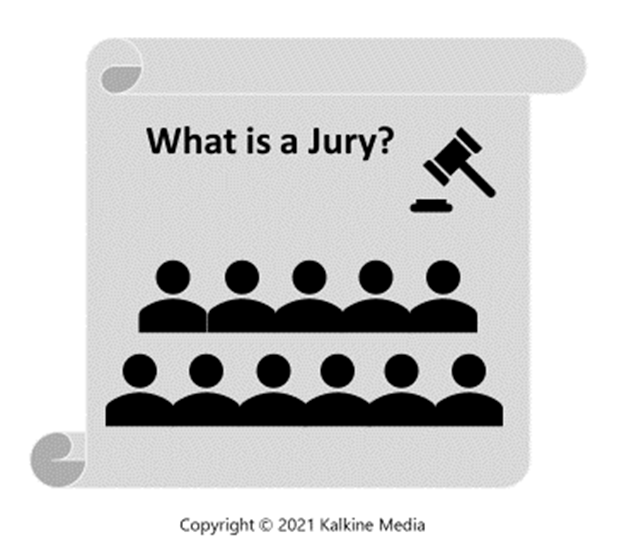What is the jury?
A jury is a body formed legally to render an impartial judgement on the matter submitted to them. The powers and characteristics of jury members (each member is known as a juror) are dependent on the laws of the respective countries.
Jury members get recruited from the broadest population for a specific task or a task assigned. The role of a jury is to discuss the issue, decide by vote and deliver to the audience.
The jury system was developed in Middle Ages in England and is still followed in the countries like United States, Great Britain, Australia, Canada, etc.
There are two types of cases that require a jury are:
- Criminal cases: When an individual has committed a crime against society as a whole, it comes under a criminal case. The criminal jury announces their verdict post all the discussions and unanimous conclusions before anyone is termed guilty.
- Civil cases: When complainants seek remedies for some private wrongs that do not directly impact society, it comes under civil cases.
Voir dire is a process that determines the suitability of the jurors. In it, judges and attorneys interview a group of qualified jurors in a courtroom. This process excludes participants who cannot decide fairly, have any prior information about the case, have any preconceptions about the issues and people involved in the case, or know anyone involved.

Advantages of a jury
- Public confidence: Jury members have less professional involvement and don’t exactly stand to gain from the outcome. A jury also gives a verdict in an open court so that there can be no bias.
- Jury equity: The jury does not consist of law experts and is not bound to follow the law if they feel the law is unjust. They can submit their verdict based on complete fairness.
- Open system: Members of the public form a jury, and deliberating the verdict is done publicly. It helps in making the judicial system more open.
- Secrecy: The discussions done in the jury room are not allowed to be discussed outside with a third party or another jury member. If the case is discussed outside the jury room, other jury members will not be on the same page of facts.
Disadvantages of a jury
- Perverse judgments: The verdict delivered by a jury can be contrary to the law and can be known as a protest against the law.
- Jury tampering: An attempt to influence the decisions of a jury in the course of the trial is known as jury tampering. It involves conversations around the case outside the court, making threats, offering bribes, etc.
- Time-consuming: The jury consists of laypersons, and they have no or less knowledge of the law. Understanding complex problems and studying difficult concepts can be time-consuming.
Common law jurisdictions in Asia, like in Pakistan, India, Singapore and Malaysia, have abolished the jury system because the juries are suspected of biasness.
Summary
- A jury is a body formed legally to render an impartial judgment on the legal matter submitted in the court.
- Every member of a jury is known as a juror.
- Jurors are selected using a process called Voir Dire.
Frequently Asked Questions (FAQs)
- What are the qualities of a good juror?
Some of the qualities that make a good juror are as follow:
- Understand others expectations from them: Jurors play a vital role in a legal system. Therefore, an effective juror must be genuine, honest, and forthcoming; they should be a good listener, take notes, ask questions, and consider all the evidence before concluding. Other than these general expectations, the jury or a juror should also follow special guidelines for a particular case.
- Be honest and sincere: While performing jury duty, a juror should be honest and devoted to the case. Therefore, it is expected from a juror that their answer will be unbiased and supported by legitimate pieces of evidence.
- Good listener: It is vital to listen to all the evidence presented and simultaneously take notes. Good listening skills are also necessary because if a juror skips a single point, they might lose an important piece of information.
- Ask questions: If a juror is unsure about anything, they should feel free to ask questions around it.
- Consider all the evidence: Conclusion of a case is like solving a mystery. Therefore, before passing the final verdict, jurors are expected to consider all pieces of evidence.
- Who is the jury foreperson?
The jury foreperson is a member and a representative of the jury. The jury elects this foreperson, and he or she is responsible for delivering the verdict on behalf of the jury. Sometimes, a jury chooses to communicate the verdict to the judge through a note written by the jury representative.
The foreperson is no more extraordinary than other jury members and can be changed anytime.
Some of the foreperson’s responsibilities other than delivering the verdict are:
- Maintain attendance: Before the discussion begins, the foreperson must ensure that everyone is present in the jury room. Full attendance is required because the talks and verdict delivery cannot start unless all jurors are present.
- Fairness in jury discussions: It is the foreperson’s responsibility to ensure that each juror gets an equal chance to present his views in meetings, even if they are not in line with other jurors thoughts.
- What is a bench trial?
On contrary to a jury trial, a bench trial involves only a judge who passes the verdict against a case, and no jury is involved. It is a quicker way to close a case as it does not involve the selection procedures and instructing of the jury. In a complex legal case, a bench trial would be preferred as the judges or attorney have better legal understanding when compared to jurors.
 Please wait processing your request...
Please wait processing your request...